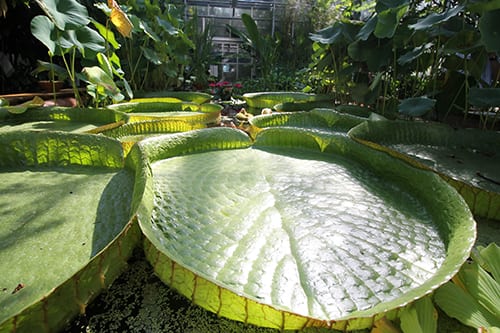A new Plant Sciences degree that will train the next generation of plant researchers to tackle major issues such as global food security for a growing population has been launched by the University of Bristol.
Bristol is home to world-class plant science, with over a third of the research at the School of Biological Sciences related to plants in areas ranging from evolution, growth and development, plant pathology, ecology, plant environmental interactions and precision agriculture. Bristol students also benefit from having a Botanic Garden at the University.
Students will be taught by experts from different areas of plant science including Dr Antony Dodd, who investigates how plants respond to their environment and have evolved ways to tell the time.
Dr Dodd, Senior Lecturer in the School of Biological Sciences, commented: “Plants underpin all of the food that we eat. Therefore, understanding how they interact with the environment at scales ranging from cellular to ecological processes is fundamental to securing our future food supply.”
Another lecturer on the course is Professor Alistair Hetherington whose research focuses on stomata, tiny pores on the surface of leaves, which mediate the movement of gas and water between plants and their environment. Studying this is important in the context of global food security – if plants can be engineered to improve the efficiency of how they use water, perhaps crops can be grown in deserts.
Professor Hetherington, Melville Wills Chair in Botany, added: “Providing the world with a sustainable supply of healthy food in the face of global environment change is one of the greatest challenges to face society in the 21st century.
“Graduates from this degree will be well-equipped to help produce the new varieties of crop which can thrive under changing environmental conditions and thereby contribute significantly towards meeting the requirements of a sustainable supply of healthy food for future generations.”
The new degree is launched the same day [Thursday 21 February] that Simon Pugh-Jones MBE will be awarded an honorary degree from Bristol, for his development of the Writhlington School Orchid Project. The project, which has been running for over 20 years, has involved secondary students in research, expeditions, horticulture and conservation of orchids. They maintain a nationally important collection of orchids and have been gold medal winners at the Chelsea Flower show.
Jane Memmott, Professor of Ecology said: “Plants are important for people for many reasons – for food, shelter, culture and wellbeing; they are also the foundation of biodiversity with many species of animal dependent on them too.”
Nicholas Wray, Curator of the Botanic Garden, added: “Training the next generation of plant biologists will be key if we are to meet the challenges caused by climate change and the pressures of growing food and conserving wild habitats in an uncertain and unpredictable environment.”
Plants are soon to hit the spotlight as the BBC have recently announced the production of Green Planet, their latest documentary series and Blue Planet’s equivalent for plants. Sir David Attenborough will narrate the surprisingly emotional stories of the plant world to wider audiences, promising to inspire the plant scientists of the future.
Studying at Bristol
The new BSc Plant Sciences degree will welcome its first students in September 2019.
Further information
Simon Pugh-Jones MBE is the founder of the Writhlington School Orchid project, which since 1993 has been leading conservation education initiatives in Africa, South Asia and Southeast Asia.
Simon will be awarded a Doctor of Science on Thursday 21 February at the 1.30 pm degree ceremony.
- In recent years there has been huge investment in life sciences in Bristol, including the £56 million Life Sciences Building with state-of-the-art research facilities and the launch of the new Faculty of Life Sciences led by Dean, Professor Jeremy Tavaré.
Written by Freya Cohen (Biology MSci)


